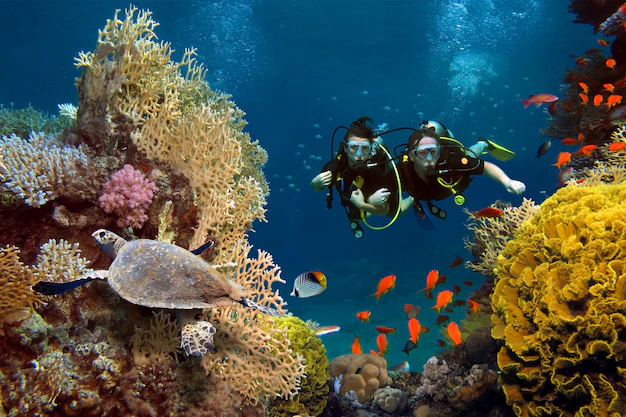Environmental Psychology Dancing in the Depths: A Kaleidoscope of Marine Life


Page Contents
Introduction
Beneath the surface of the world’s oceans lies a realm, teeming with an astonishing diversity of creatures that navigate the depths in a ballet of mesmerizing colors and behaviors. Marine life, in all its splendor, constitutes a vital and intricate component of Earth’s ecosystems. This article delves into the captivating tapestry of marine life, exploring the rich biodiversity, fascinating adaptations, and the critical role these organisms play in sustaining the health of our planet.

Interconnection Between Marine Life and Environmental Psychology
The interconnection between marine life and environmental psychology is a fascinating synergy that highlights the profound impact the oceanic realm has on the human psyche. The mesmerizing diversity and vibrant ecosystems of marine life evoke a deep emotional response, triggering feelings of awe, wonder, and interconnectedness. The rhythmic movements of schools of fish, the grace of sea turtles gliding through the water, and the vivid hues of coral reefs create a sensory experience that resonates with our innate connection to nature.
Dancing in the Depths: A Kaleidoscope of Marine Life
Diversity of Marine Life:
The oceans, covering over 70% of the Earth’s surface, harbor an unparalleled diversity of life. From the microscopic plankton to the majestic whales, marine ecosystems house a wide array of organisms. Coral reefs, often referred to as the rainforests of the sea, boast an extraordinary spectrum of life, including vibrant corals, fish of all shapes and sizes, and intricate invertebrates. Open ocean expanses are home to pelagic species like tuna, sharks, and dolphins, showcasing the adaptability of marine life to various habitats.
Adaptations and Survival Strategies:
Marine life has evolved an array of adaptations to thrive in diverse and challenging environments. From bioluminescent organisms lighting up the inky depths to camouflage experts blending seamlessly with their surroundings, the adaptations are as varied as the species themselves. Many marine organisms have developed unique defense mechanisms, such as the potent venom of cone snails or the protective shells of crustaceans, reflecting the intense competition for survival in the underwater world.
Ecosystem Services:
The importance of marine life extends beyond its sheer beauty and intrigue. Oceans play a crucial role in regulating the planet’s climate by absorbing carbon dioxide and producing oxygen. Additionally, marine organisms contribute to nutrient cycling, with processes like photosynthesis and decomposition supporting the balance of ocean ecosystems. Fisheries, a critical resource for human sustenance, depend on the abundance and health of marine life, highlighting the interconnectedness of oceans and terrestrial life.
Threats and Conservation:
Despite their resilience, marine ecosystems face unprecedented threats from human activities. Overfishing, pollution, climate change, and habitat destruction pose significant challenges to the well-being of marine life. Coral reefs, in particular, are under threat from rising sea temperatures and ocean acidification. Conservation efforts, spearheaded by organizations like the Ocean Life Institute, aim to address these challenges through research, education, and advocacy. Establishing marine protected areas, sustainable fishing practices, and reducing plastic pollution are crucial steps toward preserving the health of our oceans and the life they harbor.
Human Steward of Marine Life
Environmental psychology underscores the importance of this connection, emphasizing how exposure to natural environments, including marine ecosystems, can enhance mental well-being and foster a sense of environmental responsibility. As individuals develop a greater appreciation for marine life, they are more likely to support conservation efforts, recognizing the intrinsic value of preserving these ecosystems not just for the sake of the oceans themselves, but for the benefit of human well-being and the health of the planet as a whole.
Conclusion
Marine life, with its extraordinary diversity and resilience, captivates our imagination and underscores the interconnectedness of all life on Earth. As we unravel the secrets of the ocean, it becomes increasingly clear that the well-being of marine life is intricately linked to our own. Through responsible stewardship and a collective commitment to marine conservation, we can ensure that the dance of marine life continues, enchanting generations to come and preserving the delicate harmony of our planet’s most expansive and mysterious ecosystem.







